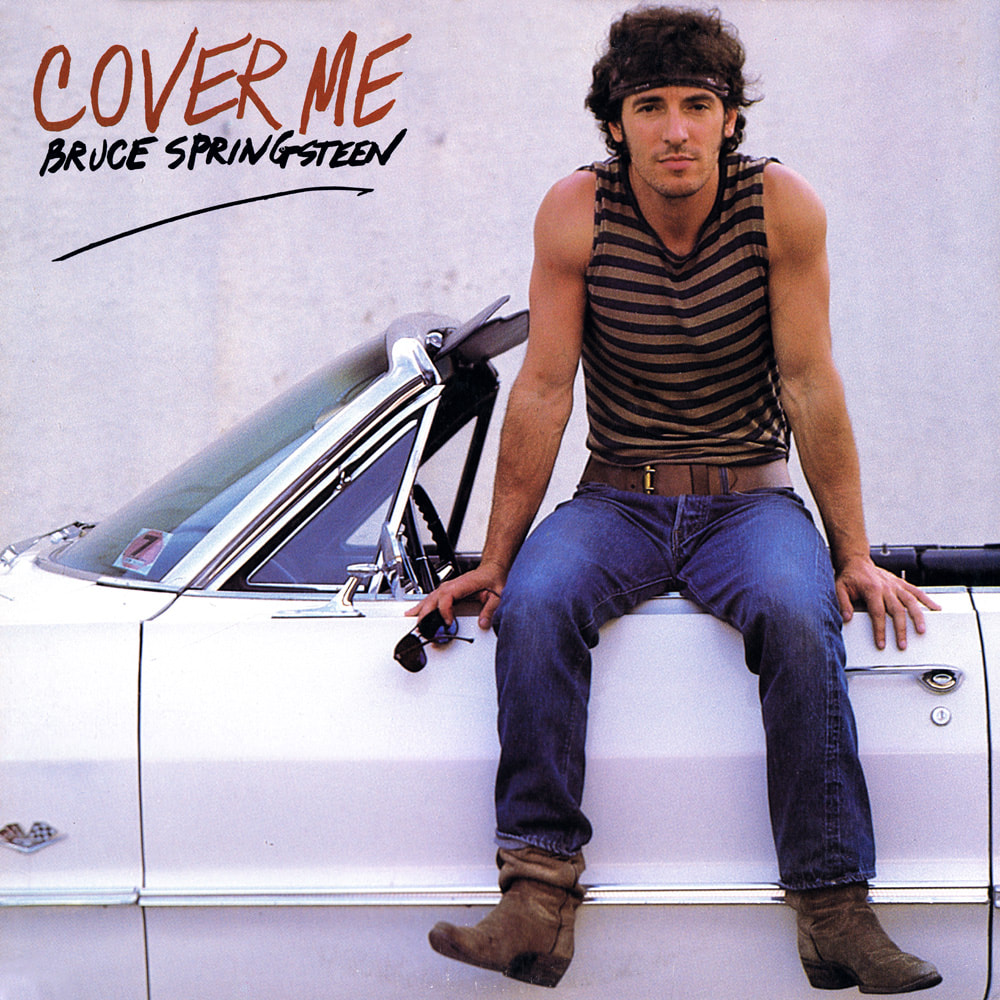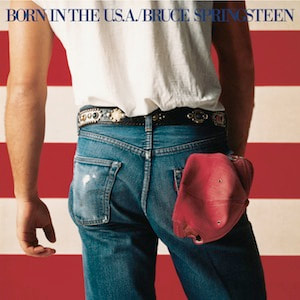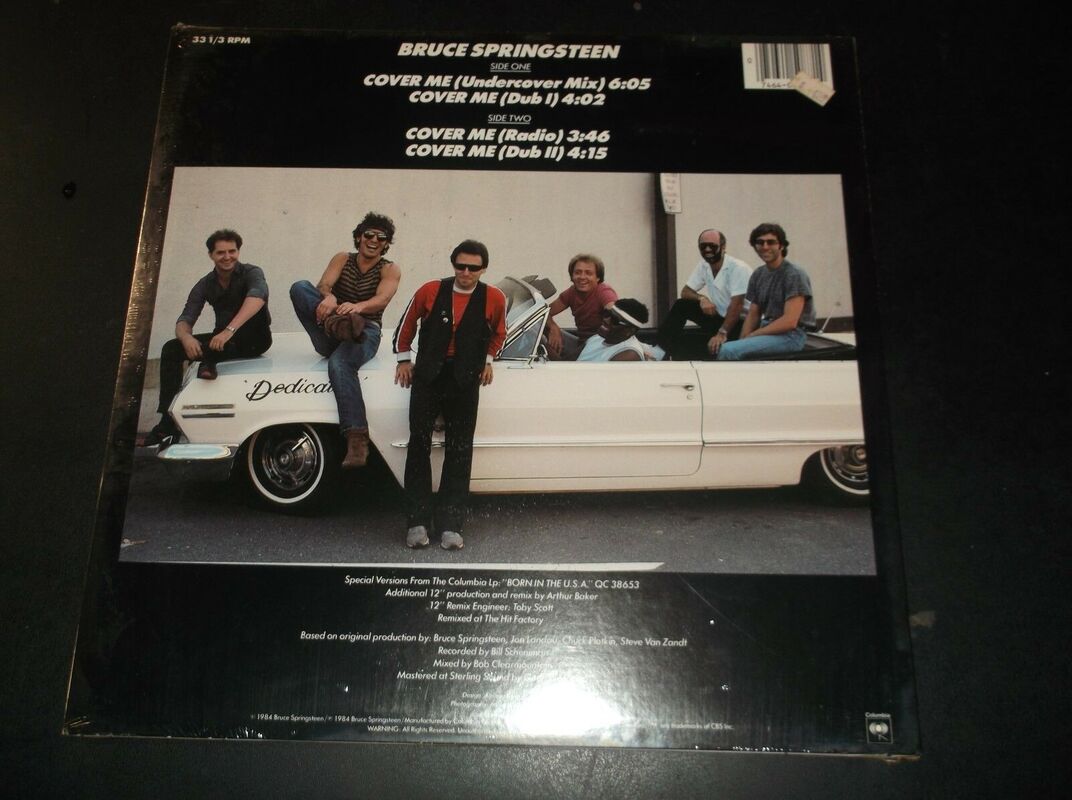 Thanks to all who read and provided feedback to my review of the song Born in the U.S.A. I promised a track-by-track review of the BITUSA album, so here is track two, Cover Me. Because I am writing these in my free time, it takes me a bit longer to get them completed (not that I think anyone is anxiously refreshing this page hoping for a new post). The best thing I can say about Cover Me is that it is not my least-favorite song on BITUSA; but even this is subject to qualifications. It is hard to think of the songs on the BITUSA album as ordinal data because they are all good. The 12th best song is not necessarily two songs worse than the 10th best song. The times are tough now, just getting tougher/This old world is rough, it's just getting rougher So where does Cover Me rank? Somewhere among the bottom three to me, and here is why. First, the lyrics don't take me anywhere. I get my opinion on this is not universal, but I look toward Springsteen lyrics to tell a story about someone. Take me some place I would not ordinarily go. Force me to consider a life situation I might not normally encounter. Cover Me does not do that. It is the story of someone looking for a lover who will come on in and cover him. Bruce’s character desires to be wrapped up in someone’s love and affection. There is nothing wrong with that. Maslow emphasized the importance of love and belonging and Springsteen regularly shares his quest for love and belonging in his songs. Much of the Tunnel of Love album, which immediately followed BITUSA, chronicles this journey. Cover Me’s protagonist does not take us anywhere. For all we know, it is about a dude who has locked himself inside a home waiting for something to fall in his lap, Turn out the light, bolt the door/I ain't going out there no more. He is putting in no effort to seek a lover to cover him. That this song was included on BITUSA while so many other excellent songs written at the same time were left off is criminal. Johnny Bye Bye is a wondrous dedication to Elvis Presley relegated to the B-side of I'm On Fire. They found him slumped up against the drain With a whole lot of trouble, yeah, running through his veins Shut Out the Light was the perfect companion to Born in the U.S.A. and was released as that song's B-side. It tells a slightly more hopeful version of a Vietnam veteran returning home, while simultaneously examining the PTSD veterans experience. Well on his porch they stretched a banner that said "Johnny Welcome Home"... Oh mama mama mama come quick I've got the shakes and I'm gonna be sick Throw your arms around me in the cold dark night Hey now mama don't shut out the light Both of those songs (or This Hard Land... or County Fair...) are better than Cover Me. Second, as with most Springsteen songs, the live version is sooooo much better than the album version. I love the beginning of live Cover Me with Patti Scialfa channeling Martha Reeves and the Vandellas to wail, “Got nowhere to run to people, got nowhere to hide”. This is immediately followed by Bruce seemingly coming out of the darkness to bellow “Cover Me” with an exaggerated emphasis on the “CUH-ver” portion of the lyric. Third, in typical 1980s fashion, the 12-inch Cover Me single released in 1984 had three (!) alternate overdubs. These are unlistenable with a ridiculous amount of synthesizers. Finally, this song was almost given to Donna Summer, and maybe with its simple lyrics and frequent chorus, it should have been. It would have done well on the disco charts, like Summer's Protection, given to her by Springsteen in 1982. But Jon Landau thought it had potential to be a pop hit, and it did hit number 7 on the Billboard charts.
One of the conundrums at a Springsteen concert is when to go to the bathroom. He plays for 3-plus hours after all, and you don't want to miss something spectacular or rare. Cover Me is my bathroom song.
1 Comment
 I’m ten years burning down the road... Actually, it is more like 36 years burning down the road. Thirty-six years is the length of time I have been listening to Bruce Springsteen’s Born in the U.S.A. album/CD/stream. On this July 4th, with our country being divided by a president and his incendiary white supremecist rhetoric, I thought it would be a good time to reflect on this song, and the impact the whole album has had on me. I was introduced to it in the fall of 1984 by my 10th grade Wayzata High School civics (I think that was the class) teacher, Roger Lipelt. Mr. Lipelt talked about how great the album was, but none of my friends really listened to it. This was Minnesota at the time of Purple Rain. It was the height of MTV and VH1. It was The Breakfast Club, Thriller, and Madonna. High school students simply did not listen to the stories of a working man and the struggles trying to make his way in the world of the mid-1980s. For a reason I cannot recall, I wanted to listen to it. Or maybe I saw the video on MTV and, like good marketing is supposed to do, it prompted me to buy the record. I was hooked on Bruce from that point forward. I have more than 200 concerts on mp3. I spent a couple hundred for a pit ticket to see him at Wrigley Field (thanks, Paul!). E Street Radio is the number two preset in my car, after my local NPR station. Born in the U.S.A. as an album is a collection of 12 songs which meander through hope and despair, optimism and pessimism, while presenting a less than flattering portrait of America in the early 1980s. I have listened to those 12 songs literally hundreds of times. My high school buddies, Bob, Flynn, and Shoe, and I had a group text exchange Memorial Day weekend in which a mashup of 80s tunes on YouTube was shared. During a modest debate as to whether or not Debbie Gibson and Tiffany were musical geniuses (they were not, and are not), I chimed in, “Springsteen is the only 80s music in my regular rotation. #getoffmylawn.” I have long wanted to put into words the impact that album, song by song, had on me. I don’t know why anyone would want to read it, but this is my creative outlet. So, if you have made it this far, here goes, starting with the title track. Born down in a dead’s man town… The song Born in the U.S.A. has changed and evolved over time, but it is consistently misinterpreted by politicians, frequently Republicans, as far back as Ronald Reagan. They have never quite understood that it is not a patriotic song. Instead, it is about a disillusioned Vietnam veteran who returns to the U.S., having lost a brother in the war, only to find no jobs, and no hope. While the World War II generation is considered The Greatest Generation, the country frequently neglects the Vietnam generation. This should be understood by now. Media outlets from The Atlantic to Rolling Stone have attempted to clarify the song’s protagonist. As part of a regular series on American Anthems in 2019, NPR’s Steve Inskeep undertook an excellent deep dive into what the song actually means. It is worth listening to it at the link. When the song debuted in 1984, it's accompanying video featured imagery illustrating the struggle between what we want as Americans living in this country on the Fourth of July and the reality of the cost to get there. I never served in the military, but am grateful to those who did. Thank you. The video, embedded below, presents the promise of youth - birthday parties, carnival rides, and prom - juxtaposed against the reality of adulthood - long lines outside a check cashing store, military maneuvers, cemeteries, and life in manufacturing. These images are blended with themes of Springsteen’s Born to Run and Thunder Road from a decade earlier. We see cars and, through the lens of the side view mirror of a motorcycle, the promise of the escape Springsteen sang about in Thunder Road, “I’m pulling out of here to win.” Nowhere to run, ain’t got nowhere to go... Except the Vietnam veteran in Born in the U.S.A. is not winning. There are no jobs, particularly for those who grew up in the dead man’s town and went off to fight the yellow man. Springsteen carries the narrative in another favorite song which could have easily fit on the Born in the U.S.A. album, Youngstown. Released in the 1990s, Springsteen revisits this theme, “We sent our sons to Korea and Vietnam. Now we wonder what they were dyin’ for.” Part of Born in the U.S.A.’s confusion may stem from how Springsteen performed it in the 1980s. Beginning August 5, 1985, Springsteen played 29 shows in football stadiums, many of them outdoors. He opened each night’s show with a hard-rocking Born in the U.S.A., such as the version from the Los Angeles Memorial Coliseum in September 1985 which appears on the Live 1975-85 Springsteen box set. Video from that era seems patriotic enough, with flag imagery, Springsteen fist pumps, and the sun's out, guns out attire. Contrast that version of the song, however, with later interpretations - the acoustic version performed on the Ghost of Tom Joad tour in the mid-1990s, or the blues-inspired version he sang during his stint on Broadway a couple years ago. These are haunting, emotional songs. Perhaps this is how he intended all along. An early demo tape version from 1982 (released on his box set, Tracks) has an acoustic feel, like the songs on his raw Nebraska album. I curated a Spotify playlist with various versions of the song, including an excellent cover by the talented husband-and-wife team, Jason Isbell and Amanda Shires. It is designed to be played in order, from 1982 to the covers. Make no mistake. Born in the U.S.A. is not a patriotic song; but, to me, it serves as a reminder about the promise of being American and living in the U.S.A. In that way, the song, and the whole album, informed my world view at a time when I was transitioning to adulthood. The song is also a haunting and vivid reminder of how quickly our country has turned its back on those in need, in much the same way certain segments of our society today seek to shut out marginalized populations through hate speech. It was more than 150 years ago, during the first three days of July 1863, soldiers fought in a battle for the soul of America. Some 50,000 casualties emerged from that fight. The message which followed a few months later is a reminder of the promise and privilege of being Born in the U.S.A. This holiday, July 4, 2020, remember that speech and what it means to be born in the U.S.A., and don’t give in to the hateful rhetoric. “Fourscore and seven years ago our fathers brought forth, on this continent, a new nation, conceived in liberty, and dedicated to the proposition that all men are created equal… It is for us the living, rather, to be dedicated here to the unfinished work which they who fought here have thus far so nobly advanced. It is rather for us to be here dedicated to the great task remaining before us—that from these honored dead we take increased devotion to that cause for which they here gave the last full measure of devotion—that we here highly resolve that these dead shall not have died in vain—that this nation, under God, shall have a new birth of freedom, and that government of the people, by the people, for the people, shall not perish from the earth.” |
AuthorThoughts and original content from Steve Dittmore. ArchivesCategories |

 RSS Feed
RSS Feed